Displaying items by tag: Peter Malone's Movie Reviews
His Three Daughters
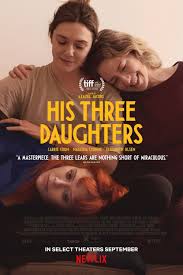
HIS THREE DAUGHTERS
US, 2024, 101 minutes, Colour.
Carrie Coon, Natasha Lyonne, Elizabeth Olsen, Rudy Gavan, Jose Febus, Jovan Adepo, Jay O.Sanders.
Directed by Azazel Jacobs.
Anton Chekhov was first with his evocative title, Three Sisters. This time the three sisters are three daughters.
This is a very strong film about family relationships, sibling relationships, the daughters and their relationship to their father, the occasion of his dying. In fact, the father does not appear through the major part of the film, emerging from his room at the end of the film. The focus is on the three daughters.
This is a dialogue and character-driven screenplay which could easily be adapted to theatre. Most of the action takes place within a house, some scenes outside with one of the daughters smoking, a visit to a shop to buy drugs, glimpses of the street. But, mainly interiors.
The father (eventually seen in the performance of Jay O.Sanders) has had two happy marriages, to sad deaths of his wives, two daughters from his first marriage, Katie and Christina, and the stepdaughter from his second marriage whom he raised as his own, Rachel.
The action takes place over the days of the father dying at home, a nurse coming in for several hours to relieve the vigil of the sisters, the liaison officer with information about their father’s condition, and Rachel’s boyfriend who is looked down on by the older sister but who speaks his mind.
Which means that the drama is mainly the interactions between the three sisters. The film opens with the oldest, Katie (Carrie Coon) married with a family and clashes with her teenage daughter, often on the phone, but practical, cleaning, cooking, severe, difficulties with Rachel who has stayed in the house to be companion to their father over the years. Christina, the youngest, (Elizabeth Olsen) is the softer character, married, a young baby, continually caring on the phone, wanting to communicate with her sisters, having to mediate in moments of anger between the two.
Rachel is casual in her manner, a very strong performance by Natasha Lyonne. Continually smoking, drugs, watching sports on TV and betting, something which she did in companionship with her father over the years. And she is being left the house. She is moody, casual, at times seemingly uninvolved, the target of Katie’s criticisms, some feelings of resentment about the two sisters, the one who is always there for their father, supporting him, sharing his life over the years.
Which means then that His Three Daughters offers audiences strong characterisations, some powerful dialogue, some dramatic interactions. It challenges the audience to check on their own family relationships, harmonies, quarrels, times of falling out.
The themes, of course, are significant and well worth thinking about and discussing.
- The title? Reminiscent of Chekhov, three sisters?
- An American story, American families, devotion, alienation, death, clashes, reconciliations?
- The screenplay, dialogue and character driven, easily adaptable for theatre?
- The situation, the dying father, past memories, his two marriages, his daughters, their place in the family, bringing all of them up? One living in New York, the other across the country, the stepdaughter from the second marriage living at home, sharing life with him?
- The audience not seeing the father until the end, his being nursed at home, the nurse coming in for several hours and helping? The consultant and his wife, indicating death to come soon, the conversations, the sisters phoning him?
- The portrait of the three sisters? The immediate impact of Katie, oldest, her situation, marriage, clash with her teenage daughter, the phone calls, strong-minded, organising, cleaning, cooking, getting exasperated? Drinking? Attitude towards Rachel, stepsister, Rachel’s character, behaviour, living at home, the prospect of her inheriting the apartment, drugs, sports, air for her father? Her growing exasperation, harsh words, angers? Her attitude towards Christina?
- Christina, youngest, quieter, more feeling, her marriage, her daughter, the continued phone calls and her care? Care for her father, sitting with him? Katie’s attitudes, her mediation? Attitude towards Rachel, attempts at communication? The two sisters and their outbursts, her trying to mediate? Her own loss of temper?
- Rachel, her mother, her stepfather becoming her father, at home, a character, sports, continued smoking, drugs, Katie asking her to leave the house, the supervisor and smoking not permitted outside? Benji, the relationship, the sports, watching, bets, doing this with her father? Her living in the house, detached, not necessarily wanting to have it? The outsider, going to the shops, buying the drugs? The clashes with Katie? Discussions with Christina? Unwilling to go in to see her father?
- Benji, the relationship with Rachel, watching the sports, his attitude towards the sisters, Katie and her disdain, his having met her before, not remembering, his strong words to Katie? Ousted?
- The days passing, the sisters and their routines, going to see their father, sitting with him, his breathing? The issue of the signing of the declaration that he not be revived, the timing, the pressures, the eventual signature?
- The father coming out, his speaking, their care, concern, attitude towards his daughters?
- The fantasy sequence, his talking, his relationships, his memories, the links with each daughter, with Rachel? And then seeing him sitting dead?
- The prospects for the future, Christina going home to her family, Katie and her concerns with her daughter, Rachel and the apartment – and future bonds, friendship, memories?
Will and Harper
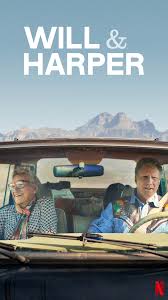
WILL AND HARPER
US, 2024, 115 minutes, Colour.
Will Ferrell, Harper Steele, and many connections from Saturday Night Live.
Directed by Josh Greenbaum.
Since the end of World War II but, especially from the 1960s on, there have been a vast number of changes in perspective on so many issues: racial equality, colonialism, communism and capitalism, refugees, disability, poverty, sexuality… We talk about them much more openly as years go on. We have experiences, for instance with migrants, opening up greater understanding. And the media, and social media…
Some of us, perhaps immediately disconcerted by new experiences, open our minds and hearts and experience a change. Some of us, shocked, threatened, hold fast to what has been handed on to us whether we understand it or not, refusing to let go.
These are some of the thoughts that come to mind immediately with Will and Harper. And, it is specifically the issue of gender identification, even more specifically, transitioning, the experience and the consequences.
When longtime friend for almost 30 years, writer for Saturday Night Live and movies for Will Ferrell, Andy Steele, emailed Ferrell to let him know that Andy was now a dead name and that she had transitioned to Harper Steele, Ferrell, like so many others, was surprised. And he came up with the idea, because of Harper’s previous now joy in driving across the United States, that they should travel together, an opportunity for discussion, for Ferrell to ask, for Harper to reflect, communicate what her life’s experience had been and now was to be.
And this film is an invitation for audiences to come along for the ride, for the experiences, for asking questions, hearing responses, empathising with the responses, learning and incorporating new perspectives.
Cameras were fitted to the front of the vehicle – but, they are at all times on occasions unobtrusive, the whole trip seeming realistic, as if we are there, observing, participating.
240 hours of film were taken but reduced to just under two hours, a variety of episodes, initial discussion with Harper’s two children and their views and experience, a visit to the Saturday Night Live set, a basketball game in Indiana, a bar in Oklahoma, a steak-eating competition in Texas, a hot air balloon ride in New Mexico. But, all the time, getting to know Harper Steele, hearing about her life, growing up in Iowa (and a visit to her sister there), self-doubts, settled for decades, therapy, decision, procedures, and the realisation that this trip was an opportunity for her to venture into familiar places in her new identity, apprehensive, sometimes reassured, some wonderful conversations but also the target of vitriolic trolling.
A two hour film where we get to know central characters offers a fine opportunity, sometimes a challenging opportunity, to understand someone, and to walk in their shoes…
- The title, introducing Will Ferrell, introducing Harper Steele?
- Audiences responding to the back story, Andrew Steele, years as a writer, Saturday Night Life, Will Ferrell’s films? Friendship with Ferrell, with the Saturday Night Life team? Andrew, marriage, children? Yet the unease, identity, gender, women’s clothes, secrecy, therapy, decision to transition, the consequences, new name, Andrew as a dead name, facing a future in his late 50s? To go out into the world with his female identity?
- Discussions about transition in the 21st-century, the past, precedents, more liberal interpretations, Conservative interpretations and condemnations of transition? Political responses, especially in the United States?
- Will Ferrell, the email giving him the information, his response, the years of friendship, the proposal of the trip, talking together, his being able to ask questions, Harper able to respond, the filming, for the record, the various activities, Ferrell inviting the audience to journey with them and share the experience?
- The importance of the initial encounter with the children and their response? The visit to Saturday Night Live at the affirmation from the friends on the set?
- The journey, the camera, unobtrusive, audiences accepting watching the couple driving, in the car, the various activities? Harper emerging, memories of the past and being accepted, wondering about acceptance now?
- The audience enjoying the activities, the basketball game, the racing cars, the hot air balloon, the night at the club in Oklahoma, Texas and the steak eating and the hostile crowd? And the visit to the hometown, and the discussions with Harper’s sister?
- The range of questions that Will Ferrell asks, questions the audience would want to ask, Harper and the probing, self questioning, realisations, apprehensions, to be appreciated, self-worth, the surprising positive reactions, Indiana and the meeting of the governor and learning of his anti-legislation? At the club in Oklahoma, the positive reactions and acceptance? The trolling and the messages after the visit in Texas?
- The realisation that an experience of a person transitioning makes a difference from theoretical analysis of the pros and cons?
- Audiences with fixed ideas, inherited, narrow, fearful? Those who invoke moral issues?
- The effect of this journey, getting to know Harper, audiences overcoming any initial fears, prejudices, the move to acceptance?
Hellboy: The Crooked Man
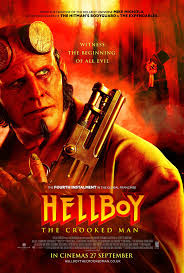
HELLBOY: THE CROOKED MAN
US, 2024, 99 minutes, Colour.
Jack Kesey, Jefferson White, Adaline Rudolph, Leah McNamara, Joseph Marcell, Hannah Margeson.
Directed by Brian Taylor.
The Hellboy comics are the work of Mike Mignola. They have been very successful, independent, not part of the Marvel Universe or the DC World. They had something of a spectacular introduction to the cinema world with the 2004 Hellboy with Ron Perlman in the title role and a very strong starring supporting cast. There was a successful sequel and a later version with David Harbour.
The commentary was that the creator, Mike Mignola, was not happy with the previous films. However, he has collaborated with this particular episode, one of his favourite stories.
A surprise for Hellboy fans will be that this is comparatively low key in terms of spectacle but very strong in terms of horror elements. The setting is 1959, the strange-looking Hellboy (Jack Kesey) with his mysterious origin, is travelling across the United States with an assistant scientist. They have a sealed cargo for experimentation – which comes loose, a giant spider, conflict in the carriage and a derailment, stranding the two in Americas South.
What follows is a variation on a southern Gothic Horror, a soldier returning home to find his family only to find death. And, there are strange local characters, a beautiful witch with her spells, her ability to take over othe characters, especially the young man’s girlfriend. The trio then go in search of the witch for confrontations.
Audiences will have to pay a bit of attention to work out who is who, especially in the witch department, beauty and ugliness, often literal darkness, characters taking over the others, violent confrontations Hellboy having to come into his own, not always as victorious as he might like (as as the audiences might like him to be), but ultimately conquering to be available for his next episode.
Definitely a film for those who are fans of the Hellboy comics and of the vision of Mike Mignola. It will be something of a surprise and, perhaps, disappointment rather low-key, for those who enjoyed the more spectacular action adventure films and Hellboy’s exploits.
- The popularity of the Hellboy comics? The vision of the creator? The previous films in this spectacle? This film more to the liking of the creator?
- Audience response to Hellboy, his mysterious origins, powers, strength, appearance, manner of speaking, skills, tough, action?
- The Southern American settings, the train, Hellboy and his assistant, the cargo, the breaking free of the spider, the fight, the derailment, the carriage, the attack of the spider, Hellboy and his destroying it?
- The atmosphere of Southern Gothic horror, the woods, the isolated cabins, the people, witchcraft, possessions, supernatural experiences?
- The arrival of Tom, his background, the war, the return, his fiancee, the encounter with Hellboy and? The explanations, Effie as a glamorous which, her powers, the past, taking over people, shape shifting, inhabiting Cora?
- Hellboy’s character, origins, mystery, determination, strength? Song, her background, academic, wanting to join in the action? Tom, the search, collaboration with the group?
- Going into the woods, the discoveries, the witchcraft, the powers, the horror?
- The confrontation, the dangers, the threats to each of the characters? The revelation of the Crooked Man?
- Hellboy, attacking, not always winning, the complications, drawing on his strength, the final confrontations and victory?
Never Let Go
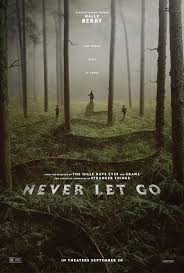
NEVER LET GO
US, 2024, 101 minutes, Colour.
Halle Berry, Percy Daggs IV, Anthony B.Jenkins, William Catlett, Matthew Kevin Anderson.
Directed by Alexandre Aja..
French-born director, Alexandra Aja, made an impact with his French horror film, High Tension, in 2003. With a strong reputation for successful horror films, he has worked mainly in the United States, remake of The Hills Have Eyes and Piranha 3D.
Which means that his fans and horror audiences were expecting some more high tension. There is tension, but of a different kind. This kind of film is better described as a terror film rather than a horror film, characters experiencing a sense of menace and uncertainty, imminent unknown threats, and the audience sharing in this unease.
And this happens in the first part of the film, slowly building up the tension (far too slow for those who want immediate gory horror moments of which there are comparatively few here). The mother and her two children isolated in the woods for years, she telling them that evil has entered the whole world and destroyed it, the whole world is now them, their family bonding, love, surviving, and an incantation to reassure that evil has not overtaken them, going out the house connected with long ropes mutual security, and the continual reminder, “never let go”.
The mother is played by veteran Halle Berry and the performances of the two boys, Anthony B.Jenkins as Sam, Percy Daggs IV as Nolan, are quite remarkable., Momma has frequent hallucinations, her dead mother, confrontations with her dead husband, reminding the boys that all these are in their imagination, not real.
Where is this leading? The last part of the film moves into action, family starving in winter, the threat to kill the family dog, desperate, even though he was their protector in the past, Nolan upset, confronting his mother, moments of doubt about the evil and its presence, wondering about the real world.
The screenplay introduces a hiking character, Nolan confronting him, wondering whether he is real or a hallucination, Sam is sceptical, but this intrusion into their world leads to a dramatic crassus, the testing of the two boys, the reappearance of their mother, more hallucinations…
Given the premise, the first half building up the atmosphere of the family and the tension, the final dramatic confrontations and resolution indicate that, of its kind (emphasising once again that this is really not a horror film and expectations that it is are misleading) it is a satisfying menace and terror drama.
- The work of the director? Horror films? Expectations? This film as terror and menace than horror?
- The backwoods settings, the isolation, the winter, the forests, the lack of animals, the bark and insects from the trees, the isolated hut and interiors? The musical score?
- The premise of the story, Momma’s story and her experience of evil, her photos, of her previous career, with her husband and children? The evil, her withdrawing from the city, taking the children, the death of her mother, the death of her husband? Telling the children that evil had taken over the world? Their isolation and fear? The food supply, its diminishing? Their starvation? The rope, keeping safe when linked? The repetition of “Never let go”? The poetic incantation on the wood, the guarantee that there was no evil in the house? The life together, the boys’ love for their mother?
- The character of the mother, her past, protectiveness, her story, the appearances of evil, her seeing them, her mother, her husband, confrontations with her husband, his threats, the old man in the woods? Hallucinations? Love for her children, protective? Starvation, cooking the bark? The issue of the dog, to kill it, her arrows, taking it to the barn, not killing the dog, confrontation with her two boys?
- The scenes of hunting, the boys, the squirrel, the grubs, cooking and eating? Venturing out, the rope? Nolan and the egg, Sam and his fall and injury?
- The boys, the characters, twins, Sam, older, serious, love his mother, thinking she preferred Nolan? Nolan, younger, mischievous, sleepwalking, taking risks?
- The dog, Nolan’s emotions, the confrontation with their mother, her hallucinations, slitting her throat, her death?
- Nolan, questioning his mother, out on the road, the stranger, coming to the house, talking, the confrontation with Sam, Sam and the arrow? Nolan following him, the 911 call on the phone? The food in the haversack? Their eating it, Sam and his scepticism, eating it?
- The little girl, real hallucination, recognising the torch? Her fear, running away? Grief at her father’s death?
- Sam and his being possessed, his appearance, setting the house alight? Looking Nolan in the room, Nolan escaping on the roof?
- The rescue, the helicopter, the real world, the vistas from the helicopter, mumble reappearing and threatening? The health, recovery, the future? Sam’s comment about his mother’s love?
- Moments of horror but a film of menace, terror and our knees?
Accident Man: Hitman's Holiday
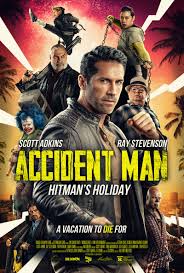
ACCIDENT MAN: HITMAN'S HOLIDAY
UK, 2022, 96 minutes, Colour.
Scott Adkins, Ray Stevenson, Kerry Benson, Sarah Chang, George Fouracres, Flaminia Cinque, Beau Fowler, Peter Lee Thomas.
Directed by George Kirby, Harry Kirby.
In 2018, British action star and martial arts champion, Scott Adkins, had success with the crime drama, Accident Man. The main villain was played by Ray Stevenson. There was an action show of fights, gangsters, betrayals, killing. In 2022, this sequel.
For the martial arts action fans, enjoyment in seeing Adkins again as the hitman, Mike Fallon, the return of Ray Stevenson as the heavy, and Perry Benson as the rather ingenuous inventor-killer.
As regards the plot, the setting is Malta, Fallon available for assassinations (plenty in Malta), teaming up with his friend, Ray Stevenson tracking him down and threatening. The basic plot is that a gangster matriarch wants protection for her son while five world assassins are trying to track him down. He is something of an idiot, a would-be singer in a club, behaves ridiculously, seems hardly worth saving. However, Fallon has to save him and fight and conquer the world assassins. He does so with the help of a friend, martial arts champion, whom he pays to come up on him suddenly to test his skills. More or less expected, lots of choreography for the fights.
While the fans enjoy this kind of film, those looking at it more seriously have many issues raised. The first is the somewhat engaging (not always) Mike Fallon is actually something of a conscienceless hitman for higher, achieving what he sets out to do, in some ways carrying some guilt for betraying friends in the previous film. But, he continues this work in the present film – and the challenge for audiences for some kind of moral perspective on who he is, what he does, the people who pay him to do this, the world of gangsters and power, thugs. And, there is the inherent violence in the fights, the necessity for the plot, not so much the what of the fights but how they are choreographed, the brutality and the violence.
Popular films – but raising issues about why they are so popular and what of the key issues for discussion.
My Old Ass
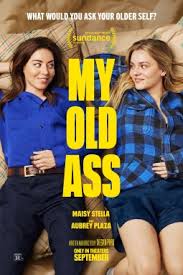
MY OLD ASS
Canada, 2024, 89 minutes, Colour.
Maisie Stella, Aubrey Plaza, Percy Hynes White, Mad Ziegler, Kerrice Brooks, Seth Isaac Johnson.
Directed by Megan Park.
A wise piece of advice for reviewers is to hold on final opinion until the end credits. Some of the issues throughout the film may be a bit disturbing but it is the resolution that counts. Which is something of the case here.
This is a film that needs to be reviewed by someone involved in family and in education, the focus being on decisions they somewhat free-spirited 18-year-old girl, Elliott (Maisie Stella, quite a strong screen presence) who has made a decision to go to study at university in Toronto, can’t wait to leave her family home and the cranberry-producing farm.
It is the 2020s. Elliott and her best friends camp out for the night to experiment with shrooms and hallucinations. Her hard-working and devoted parents are unaware of this. She has a brother who is earnest and will inherit the farm. And there is a younger brother. So, on the surface, a somewhat ordinary contemporary family. However, Elliott is also assuming that she is gay, having had no attraction to any boyfriend.
The key to the story – and the moral of the story – is her hallucination high, an encounter with her 39-year-old self, played by Aubrey Plaza, discussions, later reappearances and phone calls (an atmosphere of magic realism as well as the magic mushrooms). The older advises the younger to beware of anyone called Chad. He soon appears and is a strong a sympathetic character to the family, not the kind of person that Elliott wants to avoid the matter how hard her initial attempts.
Older teenagers watching this film could find it a catalyst for raising all kinds of personal questions, hopes and ambitions, identity, orientation, family relationships. And, older reviewers are reassured with the older Elliott’s sound advice in removing the selfish blinders on younger Elliott concerning her family, their love, their work.
The film has received some enthusiastic reviews. It has obviously touched a nerve for viewers, especially for younger teenagers, younger women.
These are the observations of an older, much older, male reviewer.
Platform 2, The
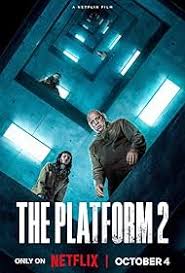
THE PLATFORM 2/ ELHOYO 2
Spain, 2024, 99 minutes, Colour.
Melina Smit, Hovikl Keuchkerian, Natalia Tena.
Directed by Galder Gaztelu-Urrutia.
In 202 The Platform made quite an impact on its first release, a strange prison, vertical with many stories, a lift going up and down distributing food, ported to the various prisoners, their status, the levels of their imprisonment.
In this sequel, the audience returns to the prison, to the platform and its foods, focusing on different prisoners and their interactions, but also highlighting hierarchical control, oppression, prisoners banding together, strategies for the food, a buildup to confrontation.
After watching the film, a Google entry indicated an analysis of the film. Audiences who have seen The Platform 2 and have enjoyed it all puzzled by it, check this link for its detailed and thoughtful analysis by Sam Haysom on the Mashable website.
https://mashable.com/article/the-platform-2-ending-explained
Gary

GARY
US, 2024, 91 minutes, Colour
Directed by Robin Dashwood.
Gary Coleman was a television phenomenon when he was a child. He appeared in the number of television episodes but was famous for Diff’rent Strokes, 1979-1986. And he became identified with his character and key phrases from his character, Arnold Jackson.
However, Coleman had a checkered career in his late teens with the cancelling of Diff’rent strokes. There were issues with his managers, financial issues, relationship with his parents and their taking some of his earnings. There was a lack of opportunity for developing his career successfully. He had a good friend in his manager, Dion. And also the support of another friend, Anna. However, there were police incidents, violent outbursts, jails and fines .
There was also the issue of his marriage, to the young Shannon Price, tumult, courts, the divorce, but their staying together. And there was the issue of his death, physical collapse, blood. And the consequent rumours on social media, accusations against Shannon Price.
There was also the physical complication of his health, kidney transplant at age 5, diminutive growth, filled out cheeks and face, anomalous appearance and the consequences of the failure of his kidney, constant dialysis, his survival to the age of 42.
With this information, the makers of this documentary have approached quite a number of friends and associates of Gary Coleman who agreed to participate as talking heads. Which means that there is the chronological outline of his life, different perspectives provided by the range of characters interviewed. And, it is notable that some dislike between individuals is not flat-out but stated quite firmly.
Gary Coleman’s parents are interviewed after his death and there are video scenes and interviews from the time they acted as his managers. Some sympathy for them but they also did exploit their son. And, Shannon Price agreed to be interviewed to give her side of the story. But, several of the other interviewees are very critical of her, especially in Dion and Anna. Shannon Price was 19 when she married Gary Coleman, young and inexperienced, immature, perhaps capitalising on him and his reputation, urging him to take on jobs for finance, the divorce, her offhand comments that people do have violent confrontations with each other, but her descriptions of the death scene, and her behaviour, her reaction against the blood, not particularly empathetic, self-concerned, then at the hospital and turning off life support which was different from what Gary Coleman had indicated for himself. However, the filmmakers point out that there was police investigation and no indication of foul play.
There are interviews with the various agents over the years, in Hollywood, and in Utah when Gary, settled. There are also co-stars, especially Todd Bridges and many excerpts from Diff’rent Strokes.
Gary Coleman was very talented as can be seen in various clips, his timing, facial expression, smart responses even at a very early age. So, this portrait and investigation hold the attention. And it also raises issues of the life of child stars, the effect of their career, financial issues, relationships, health.
Runt

RUNT
Australia, 2024, 91 minutes, Colour.
Jai Courtney, Lily LaTorre, Matt Day, Jack Thompson, Deborah Mailman, Genevieve Lemon, Jack LaTorre, Celeste Barber, Joel Jackson, Sarah Roberts, Tom Budge.
Directed by John Sheedy.
Everybody loves Runt – well, everybody except the archvillain, Fergus Fink. Even those who might profess themselves as non-dog lovers are quickly on the side of Runt. He is a stray, mixed breed, chased around the town by the authorities and angry shopowners where he has nabbed some sausages. But, he is small, non-threatening, and often, as the Americans say, he is “cute”.
We are in a West Australian town in the middle of a long, long drought, threats to the farmers, threats to the economy, and the vain and greedy landowner with the significant pun in his name, Earl Robert-Barren, Jack Thompson enjoying himself playing most arrogant! We are in sympathy with dad, Joe Courtney, inheriting the land from his father, and grandfather, an inventor, and in sympathy with mum, Celeste Barber (very nice but a bit too often the target of complaint about the terrible pies she makes). And a lively gran is at home, Genevieve lemon.
But the focus is on the children, especially Annie, 10 years old, played very confidently by Lily LaTorre. She instantly bonds with Runt and he becomes part of the family. Also at home is her older brother, Max (played by Lily’s actual older brother Jack LaTorre) who videos all his action stunts building up an extraordinary fan following and providing some exciting moments as well is plot developments with his daring-do.
After establishing the family characters and their problems, attention turns to the local fair, especially a competition an Agility Course Championship involving a whole range of dogs speeding through quite a complex obstacle course. Enter the moustachioed villain, Fergus Fink (veteran Matt Day as we have never seen him before), moustachioed, glittering cape, histrionic and narcissistic performance, straight out of old-time pantomimes. Naturally, a great deal of rivalry, and a problem because Runt is unable to perform when anyone is watching. His whole focus is on Annie so no audience to see his victory. Of course, Runt winds, enabling Annie and Runt to go to the national championships, to the scorn of Fergus Fink and, again of course, his hostility and cheating. But the goal is to compete in London, Annie and Runt qualifying but the town rallying together to get enough money to pay the air fares in London accommodation.
With Matt Day and Jack Thompson providing pantomime villain action, the film is also something of a fairytale – especially a fairy godmother in the form of Deborah Mailman, a past champion, stepping in, with charm, to help Annie and Runt in their training.
By this stage all of us, non-dog-lovers included, are in for hope for Runt’s success and the downfall of Fergus Fink. No spoilers here – but it does not all turn out as we might have expected. The spoiler is, but really no spoiler at all, a very happy ending for everyone – and including rain!
An enjoyable film, from Western Australia, with characters who, in the old days, were called battlers as they tried to survive.
- The title, the term, the underdog?
- Western Australian setting, farms and drafts, the country town and life, atmosphere, homes, the sheep, homesteads, the dam, the dry river, drought atmosphere (and the final rains), dog trials, the transition to London, atmosphere, the competitiveness? The musical score?
- The theme of the past, the Aussie battlers, making a living, exploitation by the wealthy, families keeping together?
- The introduction to Runt, being chased around the town, stealing the sausages…? The meeting with Annie? Immediately bonding? Runt and his look, attractive, shy with people watching, dependent on Annie?
- The family background, the father, the farmer, the inheritance from his grandfather and father, the inventions, rainmaking, his work with the sheep, the fences, but his interest in horticulture? The clash with Earl Robert Baron? Relationship with his wife, with Annie, with Max? His mother living with them? An engaging family? And the frequent jokes about the mother’s bad cooking and pies?
- Max, his age, his derring-do, all the stunts, filming, the many followers on social media? Going up the tower, the grandfather’s rain making machine, failing – but the later success?
- Grandmother, living at home, tough, supportive? The later meeting with Bernadette and their getting on?
- The competition, the fair, the fairground and entertainment, again the jokes about the pies, the dogs, the introduction to Fergus Fink, pantomime character, pantomime villain, boastful, his dog, his put upon assistant? The competition? The hurdles for the dogs, the speed?
- Annie, wanting to enter, with nobody watching, the time, winning? Fink’s reaction?
- The visit with Bernadette, her past, with dogs, the advice, support, training?
- The national trials, the prospect for London, Runt and the decision to have the eye shield, the reaction of Fink, his own display, the cheating? Stealing the shield?
- Life in the town, the school, shops, the police, and everybody gathering to collect money to pay for the fares to London?
- The trip to London, the poor accommodation, going to the competition, the crowds, the commentary, Runt, Fergus Fink? Runt and his being unwilling to run, the response of the crowd? The disappointment, and supporting Annie in front of the crowd, the response? Fink and his comeuppance?
- The return home, the rain, the dam overflowing, the river filling, Earl Robert Baron and his comeuppance? The welcome home, Annie and the promotions, the father and his plans and growth?
Wild Robot, The
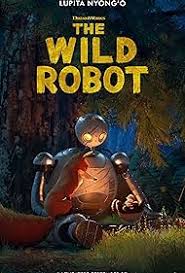
THE WILD ROBOT
US, 2024, 101 minutes, Colour.
Voices of: Lupita Nyong’o, Pedro Pascal, Kit Connor, Bill Nighy, Stephanie Hsu, Matt Berry, Ving Rhames, Mark Hamill, Catherine O'Hara.
Directed by Chris Sanders.
Fans of Peter Brown’s 2016 illustrated novel, The Wild Robot, will be delighted to see this film version. In fact, delight has been the response of audiences – and also of many critics.
We are definitely in the 21st-century with an animated family film focusing on a robot – although, Peter Brown in his detailed blog on the Internet about his writing his book over a period of eight years, has many interesting observations about origins of writing about robots as far back as the 1920s. But, to have a children’s film focusing on a robot, very much of our times. (And these years there are many films for adults with dramatic stories about androids and humans being served and protected by them as well as stories of betrayals.)
In trying to describe the perspectives of The Wild Robot, it could be said on the one hand that the picture of nature, animals in the forests, their personalities, is in the Disney tradition, especially of Bambi. And, on the other hand, the picture of robots, technology, artificial intelligence, is very much a contemporary perspective.
And, a robot in the wild, a robot whose name comes from her code initials, abbreviated to Roz, and the machine a female voice by Lupita Nyong’o. A shipwreck, Roz stranded, re-booted, the strong sense of mission (and her repeating her promotion instructions aloud). Needless to say, the wide range of animals, all enjoyably portrayed, do not respond well, fearful.
But, that is just the beginning. Two engaging characters emerge, a little Gosling bereft of family who gets the nickname Brightbird (Kit Connor) and an engaging fox, Fink (Pedro Pascal enjoying himself) whom nobody likes but who becomes a great favourite with the audience.
In fact, there is plenty of plot, Roz teaching the Gosling how to lie while looked down on by the rest of the geese; the bird migration led by the wise Longneck (Bill Nigh); some misunderstandings, some reconciliations, and Roz finally affirmed by the animals as she is able to help them in a very cold hibernation.
And, there is more with the robots, contact with the company, some ruthless executives, wanting to control Roz. While robots have no emotions, Roz learns more and more from her animal friends, standing up for herself and for them.
The film has been written and directed by Chris Sanders, best known for The Crudes series and, especially, charming action story, How to Train Your Dragon. Here he has been able to appeal to younger audiences with a great deal to interest and entertain an adult audience.
- Family-friendly animation, style, story, characters? Musical score?
- 21st-century, robots, artificial intelligence, techno developments? And memories of past animation, animals, the forests? The combination?
- The situation, the future, robots, the storm, the destruction, Roz stranded, programmed, promoting her services? The female voice? The encounter with the bear, the crushing of the geese, the survival of the Gosling, befriending it, training it, calling it Brightbill? The Fox, Fink, on the outer, yet bonding, helping with Brightbill? The possum, guides of how to mother they Gosling? But fear from the other geese?
- The range of animals in the forest, memories of Disney animals and Bambi? The fear of Roz? The importance of Brockville learning to fly, to swim, the training, eventual success?
- Brightbill, personality, growing, succeeding, information about Roz and the loss of his family? Hostility? The preparation for the migration, the role of Longneck? Brightbill and his agitation? The geese flying, the storm, taking refuge in the robot headquarters, the clashes and persecution, Brightbill not afraid, leading them to safety? Longneck sacrificing himself?
- The hibernation, the animals going into hibernation, Roz helping, their bonding with Roz? The squabbling, fights, traditions, Fink and his mediating? The episode with the bear?
- Roz, trying to reactivate, the links with the headquarters, the response at headquarters, the head, sending robots, locating Roz, the attack on the animals, the fight back, the fire?
- The geese returning, Brightbill, reconciliation with Roz?
- Roz, agreeing to leave, going back to the headquarters, working in the greenhouse, Brightbill and his visit, but her still having her emotional responses?
- The family friendly story about technology, operation by exploiters, but possibilities for harmony and peace?